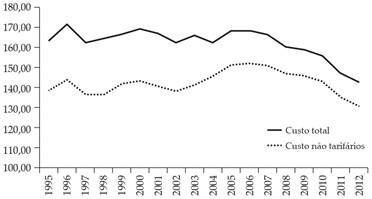Abstract:
This study analysed the evolution of Brazil’s total bilateral trade costs with major trading partners in the period from 1995 to 2012. The total trade costs were divided between tariff and non-tariff costs for the sectors of agricultural and manufactured products. It also evaluated the Brazilian trade costs with Mercosur and the effect of a reduction of it on bilateral trade flows. The results showed a continuous decrease in trade costs and in the relative importance of tariffs compared to non-tariff measures. The costs of international trade were higher for agricultural products than for manufactured ones, and increased during the “commodity boom” (2002/07), highlighting the problems of infrastructure and domestic logistics. If the goal is to improve the competitiveness of this sector, it is clear that non-tariff issues should be given priority. An index of trade costs with Mercosur partners showed lower decreases than those with non-member countries in the case of manufactured products and increased costs for agricultural products. This result demonstrates the ineffectiveness of the integration process between Mercosur countries and the need of an effective action for the removal of barriers among them.
Key-words:
international trade; trade costs; tariffs; non-tariff measures

 Thumbnail
Thumbnail
 Thumbnail
Thumbnail
 Thumbnail
Thumbnail
 Thumbnail
Thumbnail
 Fonte: Dados da pesquisa.
Fonte: Dados da pesquisa.
 Fonte: Dados da pesquisa.
Fonte: Dados da pesquisa.
 Fonte: Dados da pesquisa.
Fonte: Dados da pesquisa.
